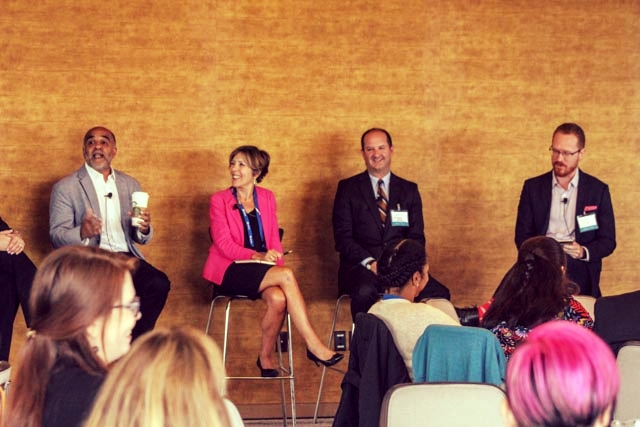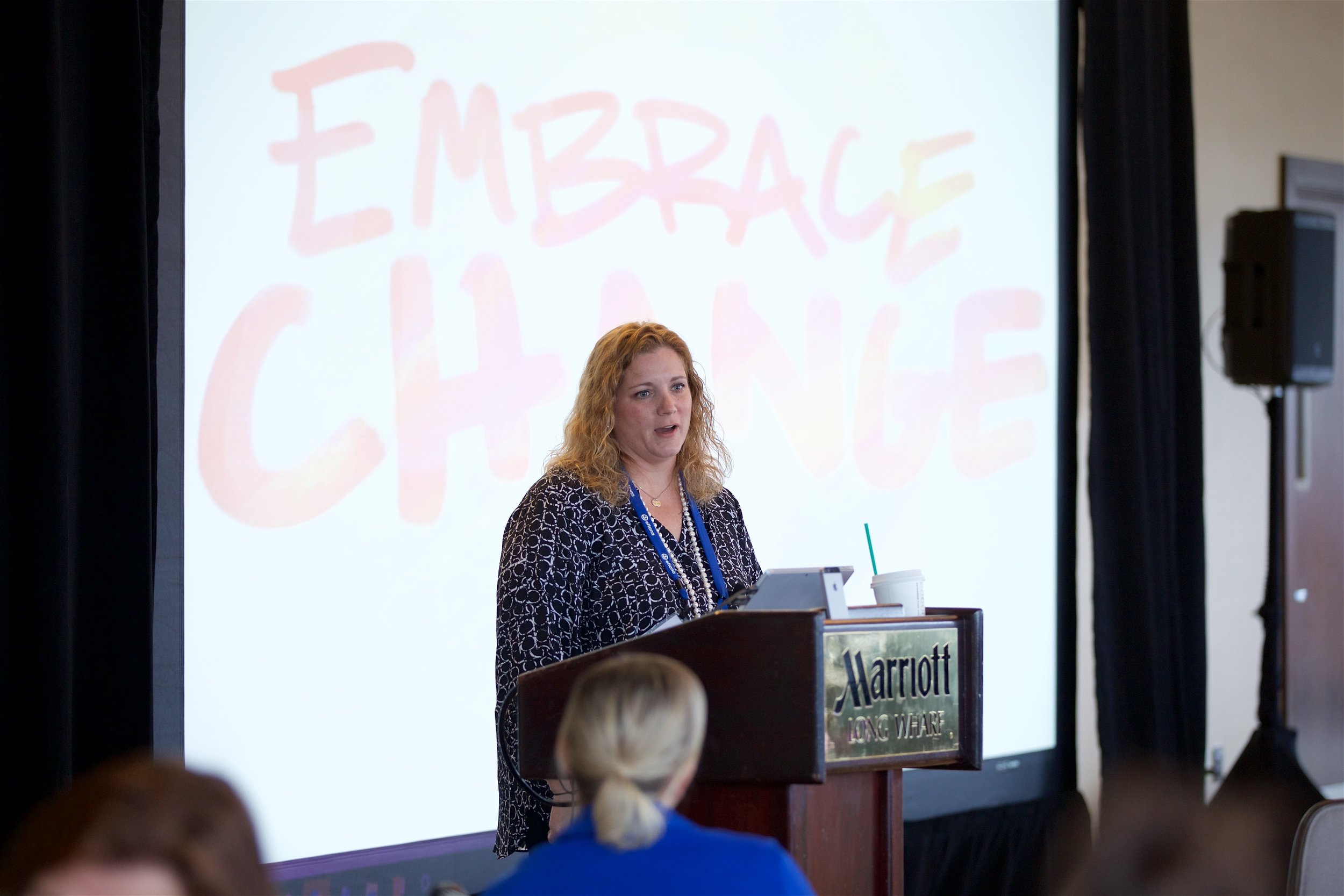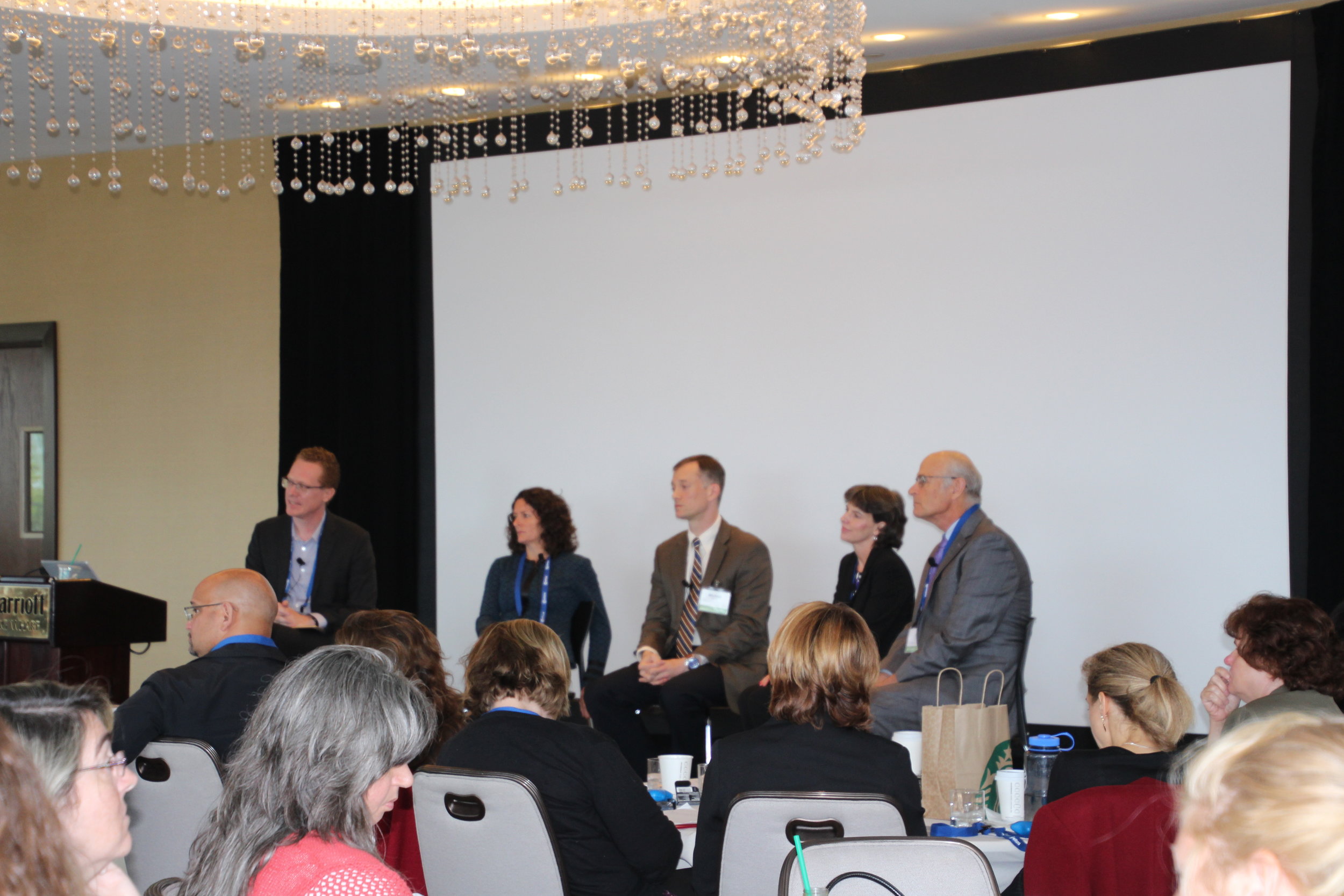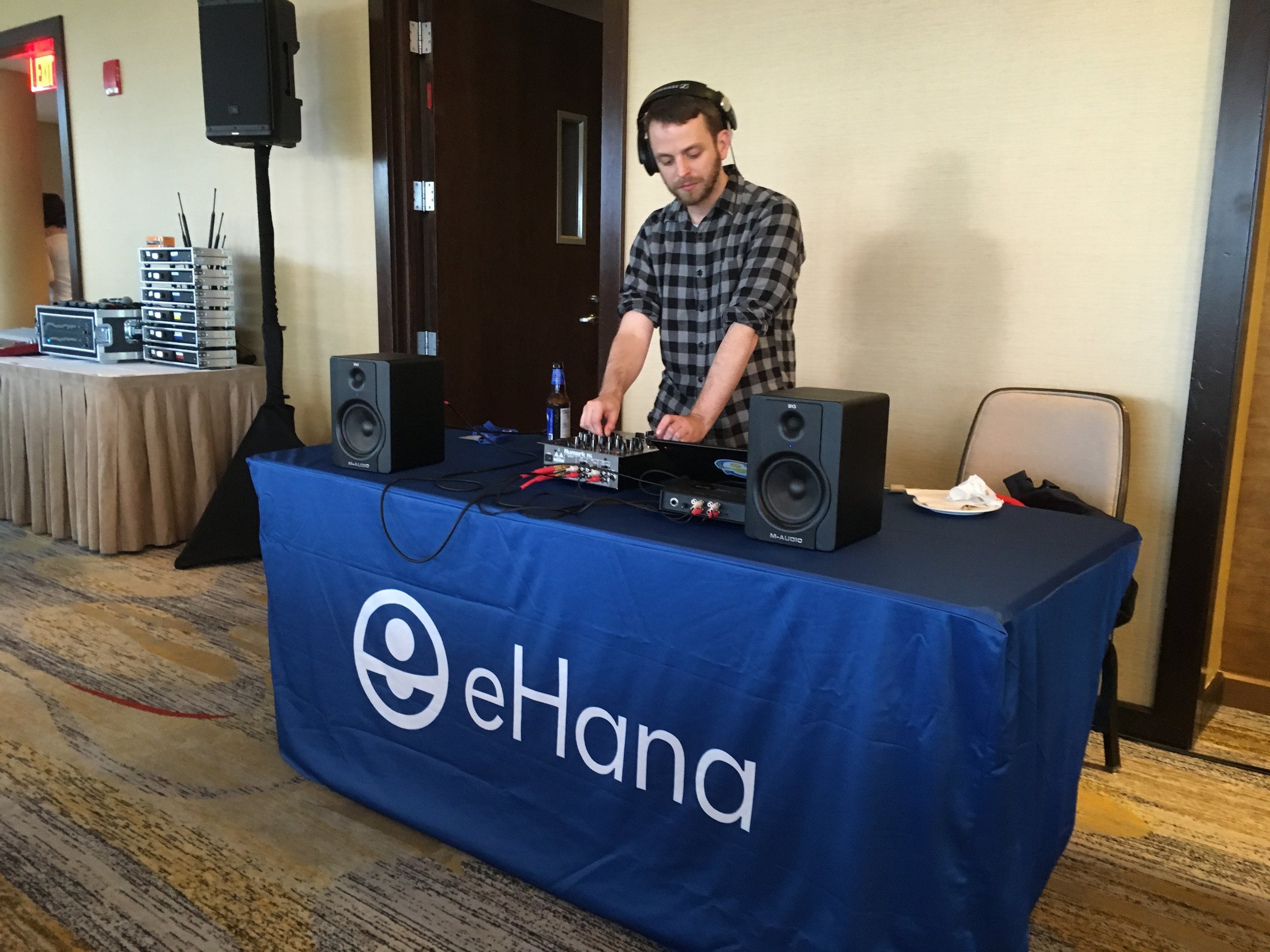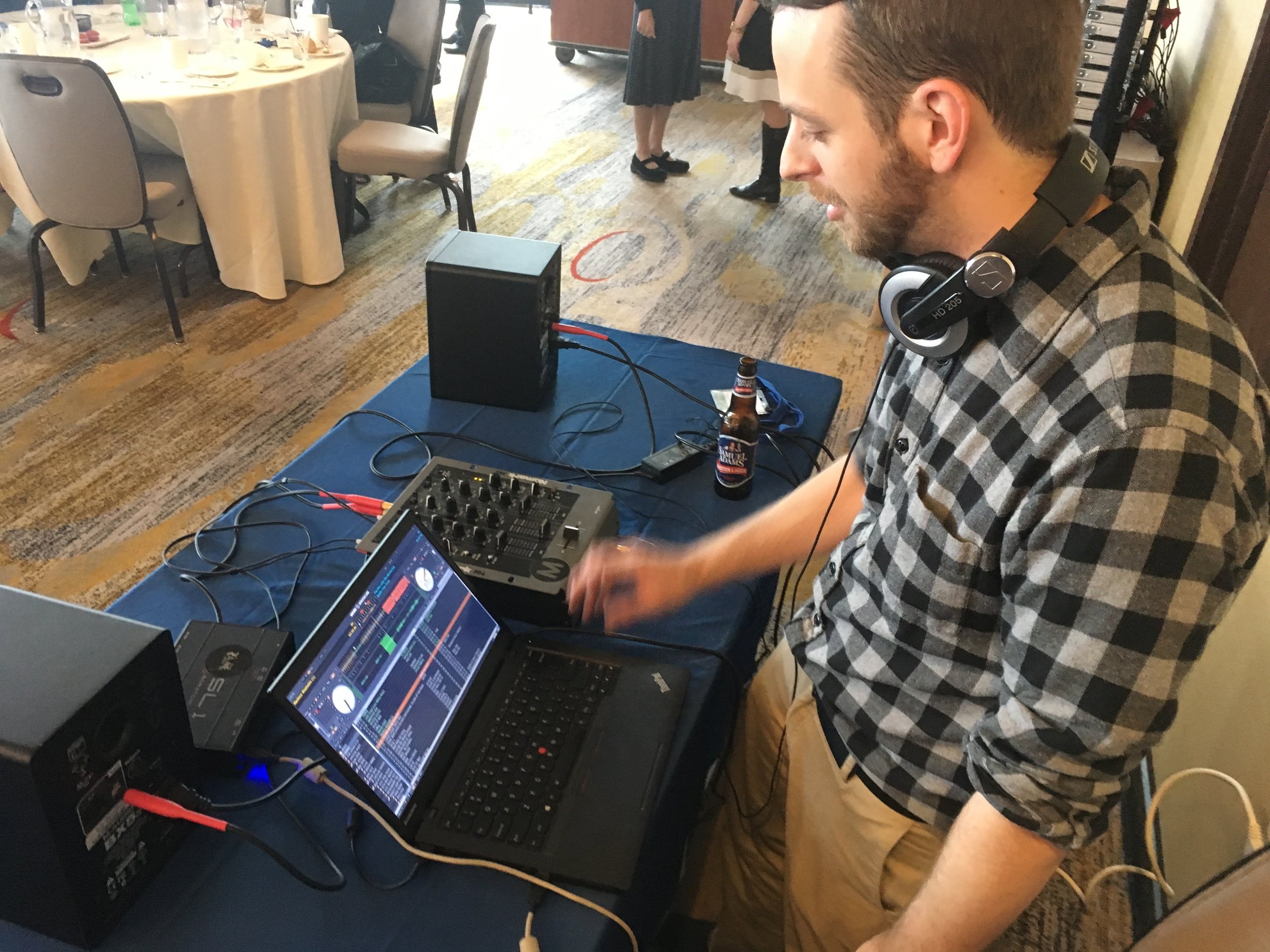New: Resources for Prospective CBHCs
eHana 2021 Giving Program Grant Recipients Announced!
eHana is pleased to announce that seventeen non-profit community-based health and human services organizations have been selected to receive grant funding through the second year of eHana’s Giving Program. Recipients are receiving up to $2,000 in funding to help enhance their telehealth and Health Information Technology (HIT) capacity and infrastructure.
“eHana is honored to partner with so many great organizations across Massachusetts,” said Jacob Buckley-Fortin, eHana CEO and co-founder. “Our Giving Program is a way for us to give back to many of these groups and further support their missions by funding costs that traditionally may not be reimbursed by their payers.”
Peter Evers, CEO of BAMSI responded to the announcement, “Thanks so much for this award. We continue to enjoy a rich relationship with eHana, one which benefits the people we serve.”
Barbara Wilson, CEO of Family Continuity Programs said, “I am thrilled and so appreciate eHana’s support in assisting us with this business critical need.”
Andrew Stephens, Director of Clinical Operations at one of eHana’s newest customers, Making Opportunity Count, Inc. commented, “Thank you so much for the opportunity to apply for this funding and for this award; we will put the funding to good use enhancing our HIT and telehealth capacity. We are incredibly appreciative of eHana's thoughtfulness and generosity in developing this grant program.”
The following organizations have been selected to receive grant funding this year from eHana:
BAMSI will use their grant to purchase iPads and kiosk table stands for their nurses to use in group residences serving medically complex individuals.
Bay Cove Human Services plans to use funding from eHana to purchase laptops, tablets or other specialized devices for individuals they serve to ensure they are able to access all of the various supports offered by Bay Cove.
Bay State Community Services is using their award to provide families served by The Greater South Shore Behavioral Health Collaborative with devices so those families can connect with the resources that can help them stabilize and thrive.
Bridgewell’s grant will be used to purchase tablets to loan to individuals they serve who are not able to attend in-person services due to COVID concerns or other health issues.
Doctor Franklin Perkins School is using eHana grant funding to expand their HIT infrastructure to grow their PQI efforts and to help facilitate their expanded use of eHana’s EHR as they complete their merger with the RFK Action Corps.
Family Continuity Programs plans to use their grant to expand their ability to offer services remotely to the individuals they serve, specifically by updating their fleet of laptops being used by FCP clinicians.
Greater Lynn Senior Services is using eHana funding to strengthen their HIT infrastructure for population health services they provide through the North Region LTSS Community Partner and One Care programs.
Italian Home for Children’s grant will be used to fund new HIT capacity as they implement upcoming program expansion and changes to better meet the needs of the children and families they serve.
Jewish Family Services of Western Massachusetts will use their grant to purchase chromebooks for clients in their New Americans program which serves refugees newly arrived to the United States. The chromebooks will be used to develop their clients digital literacy to aid in their search for meaningful employment.
Lifestream, Inc. is using eHana grant funding to provide iPads, tablets or other devices to allow their staff to enter data and other information directly into eHana’s EHR in real time. This new capacity will allow Lifestream to significantly improve their internal processes and workflow.
Making Opportunity Count, Inc. is using their grant to help defer HIT infrastructure costs as they establish their new outpatient mental health clinic. Funding will be used for video conference software subscription and hardware including HD cameras.
North Suffolk Mental Health Association plans to use their award to expand the use of tablets in their Community Support Program (CSP). Currently seven staff share three devices which makes client intakes challenging. eHana funding will allow North Suffolk to purchase additional devices to make client intake more efficient.
Old Colony YMCA plans to use their grant funding to purchase and implement an electronic signature platform to enhance their ability to do remote intake for individuals served by their mental health clinic. This platform will allow Old Colony to engage individuals in treatment more quickly and expand the number of individuals they serve remotely.
Open Sky Community Services’ grant will be used to purchase chromebooks for their Community Based Day Support Programs. These devices will allow staff to enter documentation directly into eHana’s EHR.
Sunshine Village is using funding from eHana to purchase “refurbished” chromebooks for use by their clients who are receiving services virtually or in their homes. Clients use the chromebooks for a variety of purposes including meeting virtually with friends and family from the safety of their homes.
Victory Programs Inc. intends to use their grant to develop HIT capacity for a new Low Threshold House Search and Stabilization Program they are starting to serve adults who are homeless in the Mass Ave/Melnea Cass Boulevard neighborhood of Boston. The program will facilitate and support the transition of individuals served from homelessness to permanent housing.
Western Massachusetts Elder Care will use their grant for the purchase of additional iPads to allow the teams in their Community Partner program to better serve clients through telehealth. The ability to provide telehealth services is especially critical because they serve a culturally diverse population which has been reluctant to accept COVID vaccine recommendations.
The latest webinars from the eHana team
Photo by Simon Abrams on Unsplash
We’re excited to unveil our new Webinars Library, a central location for accessing eHana’s webinar recordings. In the library you’ll find:
Our COVID-19 Service Delivery Trends series (April 2020, June 2020, May 2021) covering behavioral health and human service trends since the start of the pandemic;
The 21st Century Cures Act Information Blocking Webinar, put on in collaboration with the Association for Behavioral Healthcare;
A recent ADDP Massachusetts member Lunch & Learn (accessible by ADDP members);
Our Supporting Remote Teams Leadership Webinar, providing guidance and best practices for managing teams in this new environment;
… and many more!
Please Contact Us if there are topics you’d like us to cover in a future webinar!
Celebrating 2 years of Community Partners & ACCS in Massachusetts
Photo by Kelly Sikkema
We didn’t want to let today pass without celebrating the second anniversary of a big date in Massachusetts – July 1st, 2018. This was the first day of operation for both the MassHealth (MA Medicaid) Community Partners (CP) and MA DMH’s Adult Community Clinical Services (ACCS), as well as the official “go live” date for eHana’s platforms supporting both programs.
The eHana team wanted to take a moment to congratulate our customers who have worked so hard to make both of these programs a success over the past two years. The work they do every day to serve CP members and ACCS clients continues to impress and inspire us. These programs have proven especially critical (and adaptable) during our current pandemic – coordinating and managing care, delivering important clinical services, and providing housing, peer support, and many other services both virtually and in person.
At eHana we’ve been proud to partner with 23 of the 27 CPs and half of ACCS providers statewide. eHana’s CP groups serve 90% of CP members in the state while our ACCS partners work with 56% of all ACCS clients. The scale of these programs are impressive: in the first six months of this year, CP program staff completed nearly 586,000 documents in eHana’s CP platform, while ACCS staff completed just over 651,000 documents in our EHR platform.
Despite being two years in, we continue to invest heavily in both our CP and ACCS platforms, collaborating with customer, state, and payer stakeholders to provide platform updates on an ongoing basis. In 2020 our emphasis has been on deep embedded analytics functionality to support the unique programmatic and quality requirements of each program, and to provide actionable insight for teams on both an individual-member and population-health level.
To our ACCS and CP partners – we are honored to work with you, and congratulate you on reaching this important milestone. We wish you all the success in the years to come.
eHana 2020 Health IT Grant Recipients Announced!
Photo by Tim Mossholder on Unsplash
eHana is pleased to announce that twelve community-based organizations have been selected to receive grant funding through eHana’s Giving Program. Each grant recipient will receive $2,000 in funding to help enhance their Health Information Technology (HIT) and telehealth capacity and infrastructure.
“We’re excited to be able to provide this support to each of these important providers,” said Jacob Buckley-Fortin, eHana CEO and Co-Founder. “eHana believes strongly in the transformational capabilities of health information technology for community-based organizations, especially in these challenging times.”
Daurice Cox, President & CEO of Bay State Community Services, acknowledged the importance of technology funds in this uncertain time. “This funding will enable us to serve the youth living in our adolescent group homes and homeless shelters during this unprecedented time of COVID-19. We are so grateful for eHana’s leadership, partnership and generous support of BSCS and our mission,” she said.
Kim Lee, Vice President of Resource Development and Branding of Mental Health Association, responded to the award: “We are thankful and humbled by eHana’s faith in our work and their willingness to support our efforts to ensure access to needed emotional health and wellness is uninterrupted during these turbulent times.”
The following organizations have been selected to receive grant funding this year from eHana:
BAMSI plans to use funding to license telehealth technology, as well as to purchase webcams, headsets, and computers for use throughout BAMSI’s clincal programs and 78 group homes.
Bay State Community Services will issue company-owned cell phones and laptops to staff serving adolescent group homes and homeless shelters.
Bridgewell plans to purchase iPads for programs to be used for remote intake and assessment throughout its 100+ programs.
Doctor Franklin Perkins School will license digital signature technology for use across at least seven divisions (Quality and Performance Improvement, Residential, Education, Adults, Behavioral Health, HR, and Finance).
Doc Wayne Youth Services will license telehealth technology to support its unique sports-driven mental health programs, with coaches providing individual sessions to clients virtually.
Family Continuity Programs plans to fund infrastructure to support emergency access to telehealth and other remote services to the 10,000 children, families, and individuals they serve.
Jewish Family Services of Western Massachusetts will focus on core technology needs for its refugee resettlement program in order to move staff from office-based desktop computers to mobile work-from-home arrangements.
Mental Health Association plans to use funds to support its existing TeleWell telehealth program via their BestLife outpatient behavioral health center for emotional wellness, connecting clients with clinicians, psychiatrists, and therapies for continued health and mental wellness.
Old Colony YMCA will support data-driven decision making and development of targeted interventions via improvements in technology and staff training in order to better support its large 31-town service area.
Open Sky Community Services will focus funding on implementing a telehealth transition for its clinical programs and 62 group living residences, including outpatient psychiatry, primary care, urgent care appointments, nursing, occupational therapy, outreach counseling, peer coaching, recovery coaching, housing assistance, and other supports.
ServiceNet will purchase iPads to help facilitate the expansion of its existing outpatient-based telehealth program to residents of its 75 group homes.
Victory Programs will use funds to invest in laptops, desktops, wifi, webcams, and other technology to enable staff to support clients’ shelter, sustenance, recovery, and care needs while practicing safe distancing.
The schedule for the eHana Giving Program was accelerated in response to the COVID-19 Pandemic, doubling awards available and accelerating the disbursement schedule. “It made sense to award the grants as quickly as possible, and to support as many organizations as we possibly could,” said Buckley-Fortin. “We’ve seen a dramatic increase in the use of telehealth especially, which can require specialized hardware and internet connectivity upgrades. Our hope is that this funding will enable organizations to adapt to the changed world we’ve been thrust into and build new, sustainable, models of care.”
Congratulations to Amanda Berriault, eHana NatCon20 scholarship winner!
eHana is pleased to announce that Amanda Berriault, Program Director at Aspire Health Alliance, has been selected as the eHana / Association for Behavioral Healthcare 2020 NatCon Scholarship recipient! Amanda hopes to use her time at this year’s National Council Conference in Austin, Texas to learn ways her programs can better support individuals with cooccuring behavioral health and substance use needs. Congratulations, Amanda!
About the eHana/ABH NatCon Scholarship
eHana was delighted to partner once again with Massachusetts’ Association for Behavioral Healthcare to offer a scholarship to the National Council for Behavioral Health annual conference in Austin, Texas April 5 - 7 2020. This scholarship aims to help an individual from an ABH member organization take advantage of the amazing community, continuing education opportunities, and invaluable networking that occur during the NatCon conference, and covers conference registration and lodging. Applicants are required to be employed by an ABH member organization, and had to submit an essay detailing how they and their organization would benefit from attending the conference.
eHana and ABH thank all the 2020 applicants for their excellent submissions.
Win a scholarship to NatCon20 in Austin!
eHana is delighted to partner once again with Massachusetts’ Association for Behavioral Healthcare to offer a scholarship to the National Council for Behavioral Health annual conference in Austin, Texas April 5 - 7 2020. eHana plans to help an individual from an ABH member organization take advantage of the amazing community, continuing education opportunities, and invaluable networking that occur during the NatCon conference!
Applicants should be employed by an ABH member organization, and will need to submit an essay detailing how they and their organization would benefit from attending the conference. For more information email scholarships@ehana.com. The deadline for submission is January 3rd, 2020. See you in Austin!
eHana 'Ohana 2019 Recap
On September 25th over 150 providers, leaders, and innovators gathered at the Boston Newton Marriott for a day of learning, collaborating, and networking at the sixth annual eHana ‘Ohana Conference. The event was a huge success, with a mix of informative presentations, engaging panels, and peer networking focused on the challenges and opportunities facing behavioral health, intellectual/developmental disability, substance use disorder, and social service providers in 2019.
The conference opened with eHana CEO Jacob Buckley-Fortin analyzing recent technology trends, followed by eHana’s VP of Product and Services Kaipo Henning drilling into the day’s theme of using data to support providers as the industry continues its shift from a fee-for-service payment model to value-based care.
““Controlled chaos is okay, but you need a plan to work through the chaos.””

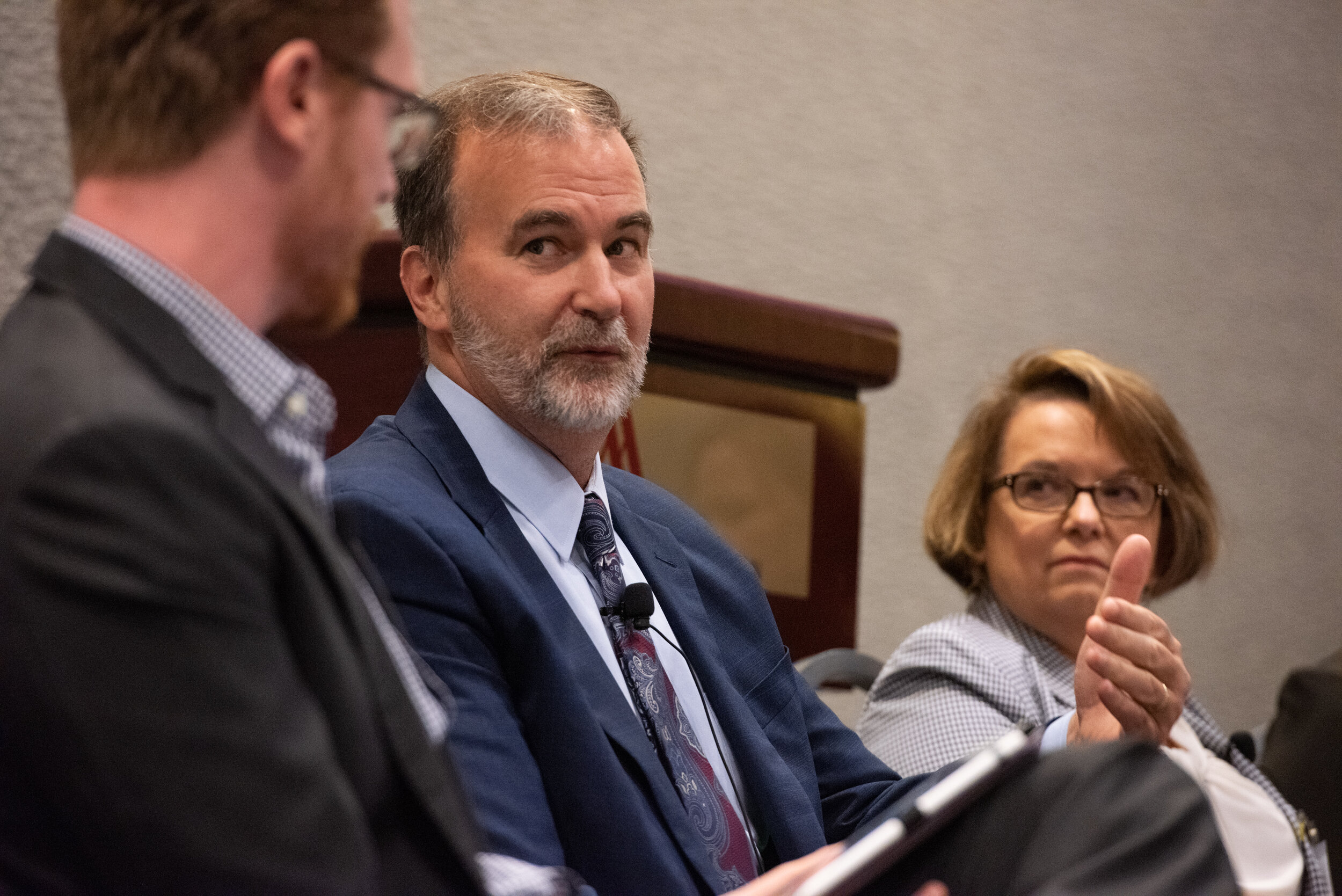

Many of the day’s sessions and panels dealt with operating in an industry that never stands still: changing payment models, new partnerships, evolving technology, and persistent workforce and rate-setting challenges.
During the “Leadership in a Time of Change” panel, leaders Chris Tuttle (Bridgewell), Ann Pelletier Parker (Advocates & BHPMW), Rebekah Conway Roulier (Doc Wayne), and Ken Bates (Open Sky Community Services) discussed how their organizations adapt and evolve in a changing environment. In the words of Bridgewell’s Chris Tuttle: “Sometimes fear of chaos stops organizations from growing. Controlled chaos is okay, but you need a plan to work through the chaos. Don’t fear the unknown - embrace failure because it means you’re trying.”
At the association leaders panel, Lydia Conley from the Association for Behavioral Health, Ellen Attaliades from the Association of Developmental Disabilities Providers, and Kathryn Cohen from the Children's League of Massachusetts discussed their respective industries, their advocacy efforts, and the on-the-ground impact of system-wide change. One common thread involved managing the constantly-changing expectations of different payers and funders – often with their own unique data collection and reporting needs.
Once you’ve adapted your IT systems to the changing environment, how do you roll out new features and support your teams? That was the topic covered in a session with experts from eHana and Luke Welling, an EHR Specialist at Springfield, Massachusetts-based provider CHD. When new features are rolled out, Luke recommended setting up consistent and repeatable communication pathways, distributing relevant information to as many people as possible, soliciting feedback from super users and key committees, encouraging awareness with techniques borrowed from marketing (such as catchy subject lines), and distilling and simplifying release notes for broad distribution.
““We are all embarking on this journey together to figure out what it means to pay for value instead of volume.””
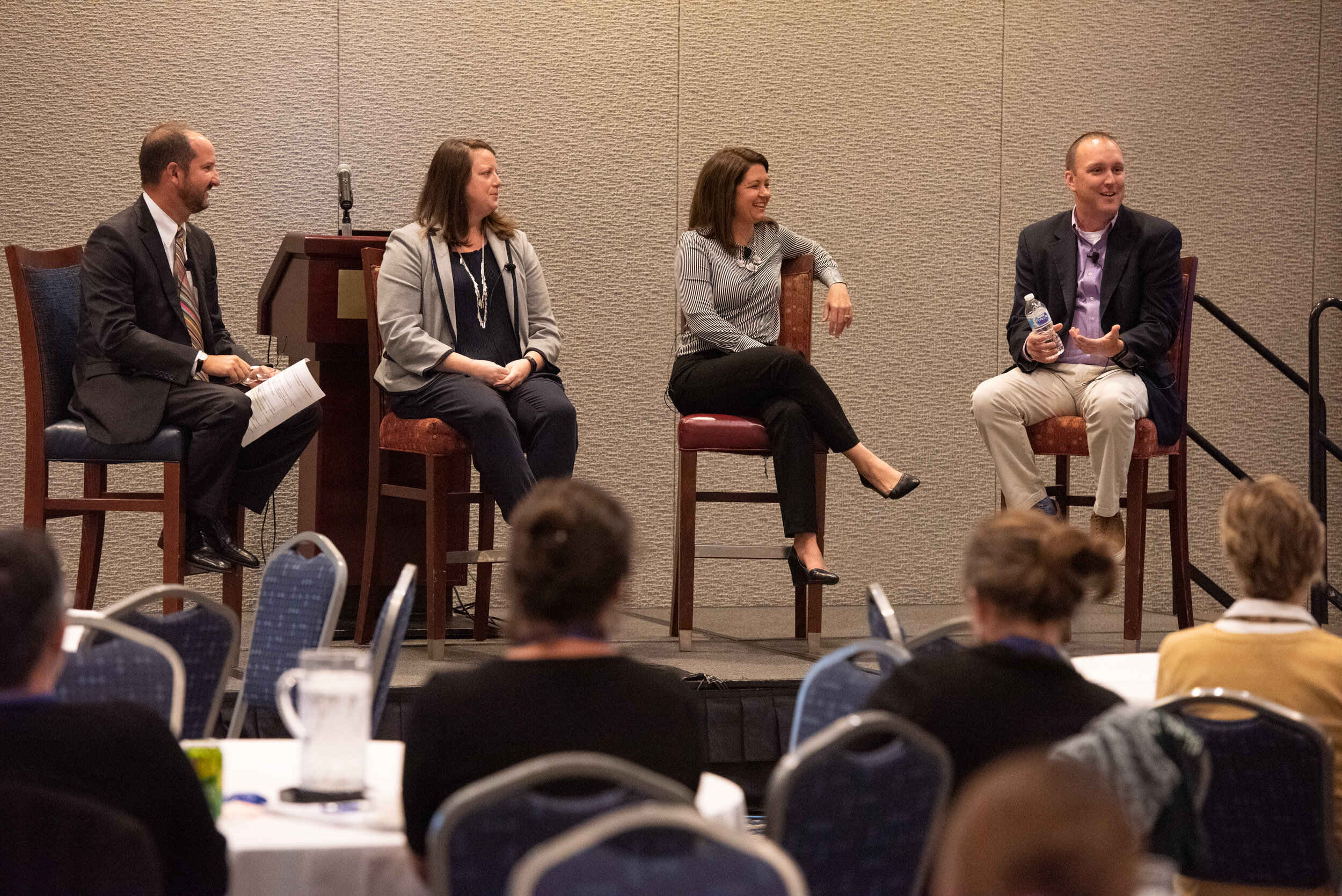
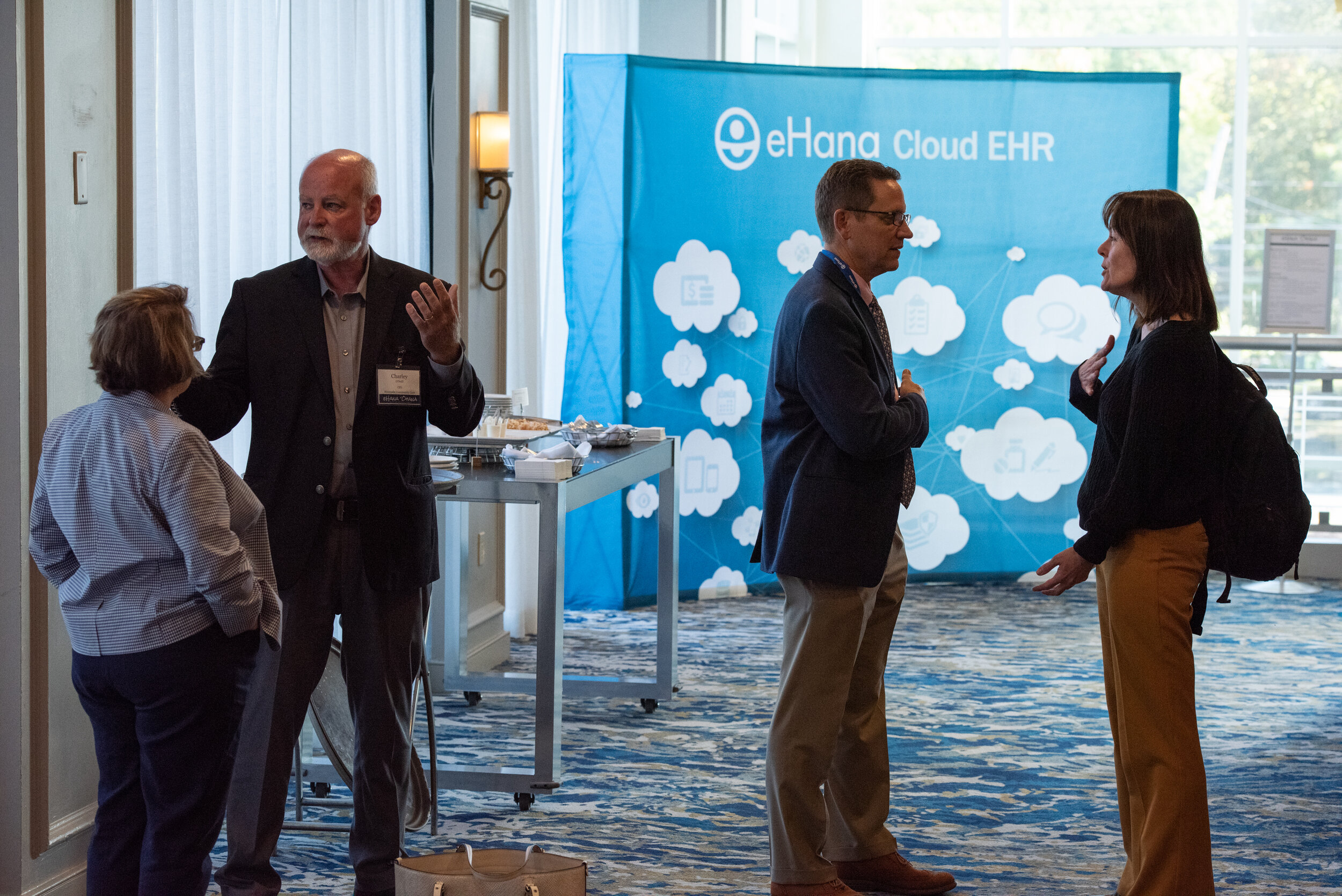

The industry continues its slow move from a fee-for-service model to an accountable care/value-based model of payment, where providers are paid for the quality and cost-effectiveness of the care they provide.
During a panel moderated by eHana’s VP of Strategy Vic DiGravio, local behavioral health payers discussed practical challenges of applying value-based payment models to behavioral health and human service providers. Cara Eldridge of Tufts Health Plan encouraged providers to ask “what problem am I trying to solve? What outcomes measures can I use to measure success?” and to focus on 2-3 measures in a niche area, such as Medication Assisted Treatment (MAT). Mark Deasy of Beacon Health Options observed that “every provider is different” and said to expect meaningful working conversations with payers to get value-based payment (VBP) models right. Angie Costello, also of Tufts Health Plan, summed things up: “It’s hard work getting these programs going.”
“We’re all embarking on this journey together,” observed Stephanie Jordan Brown, acting head of the Office of Behavioral Health for MassHealth (Massachusetts Medicaid) during the session “The EHR of the Future.” Stephanie was joined by Courtney DeWolfe, MassHealth’s Director of Behavioral Health Policy and Finance, to discuss designing EHRs to meet evolving industry requirements and “de-siloing” information systems to provide more effective whole-person care. One of the many fascinating topics included the power of innovative technology to inform public policy, and how EHRs in particular can act as a powerful tool for collecting data in support of the move to value-based care.
During his morning keynote, eHana CEO Jacob Buckley-Fortin used the metaphor of exploring the wild west frontier to explain the transition to value-based care: the frontier has been explored, the initial settlements are built, and now providers are planting seeds, preparing for the future. One of these “seeds” is the MassHealth Community Partner (CP) program, an innovative and experimental care coordination and care management program, provided in collaboration with Medicaid Accountable Care Organizations (ACOs). eHana currently provides the core technology for 21 of the 27 contracted MassHealth Community Partners.
Camille Vasquez, the Deputy Director of Implementation and Reporting for the MassHealth Community Partner (CP) program, presented an update on the state’s CP program to a packed breakout room. She pointed to a “huge variety” of relationships defined in over 280 individual contracts signed between CPs and ACOs and presented real-world examples of CPs dramatically improving patient outcomes and reducing the overall cost of care.
““The solution is to build partnerships to coordinate and integrate care across the healthcare continuum.””
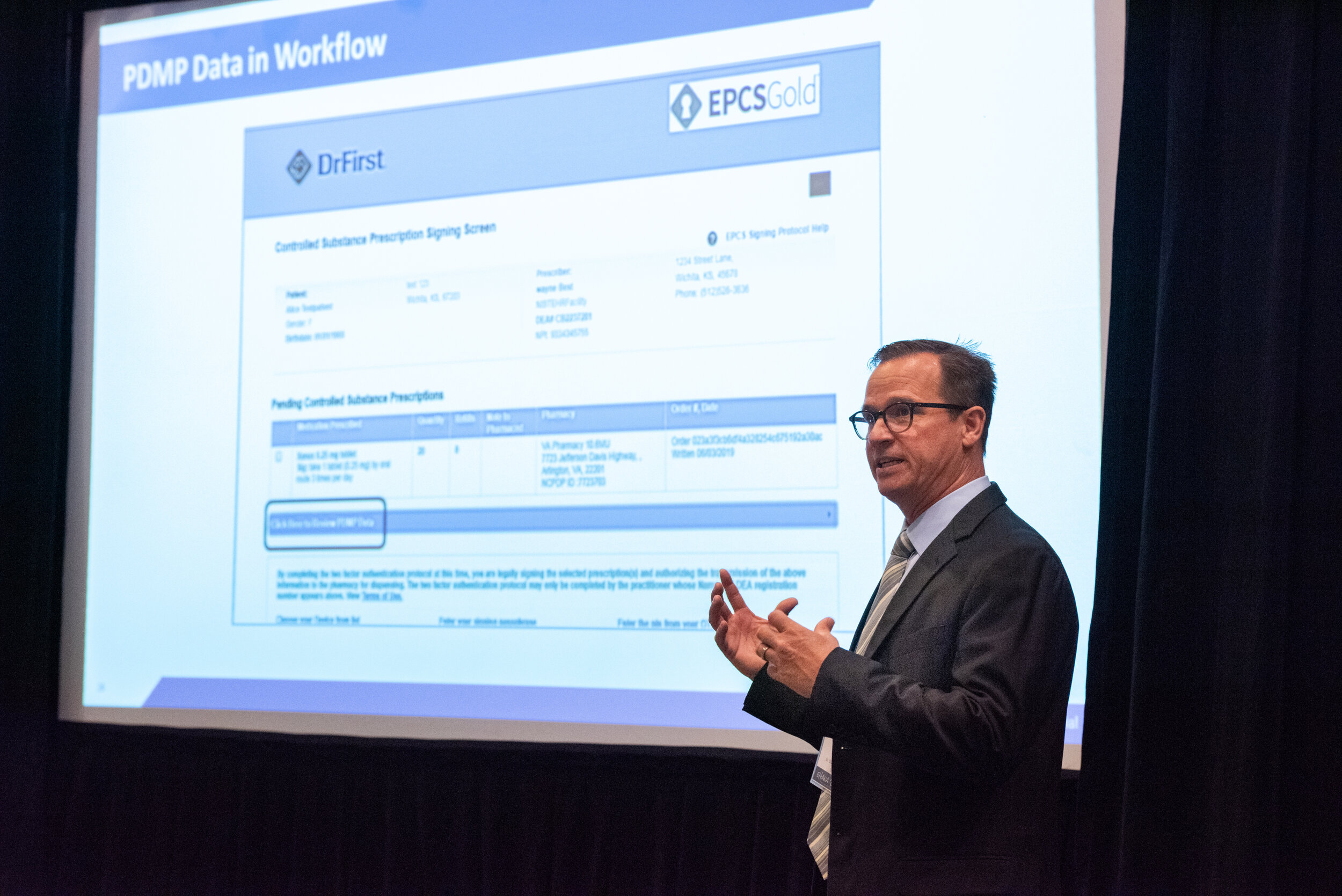
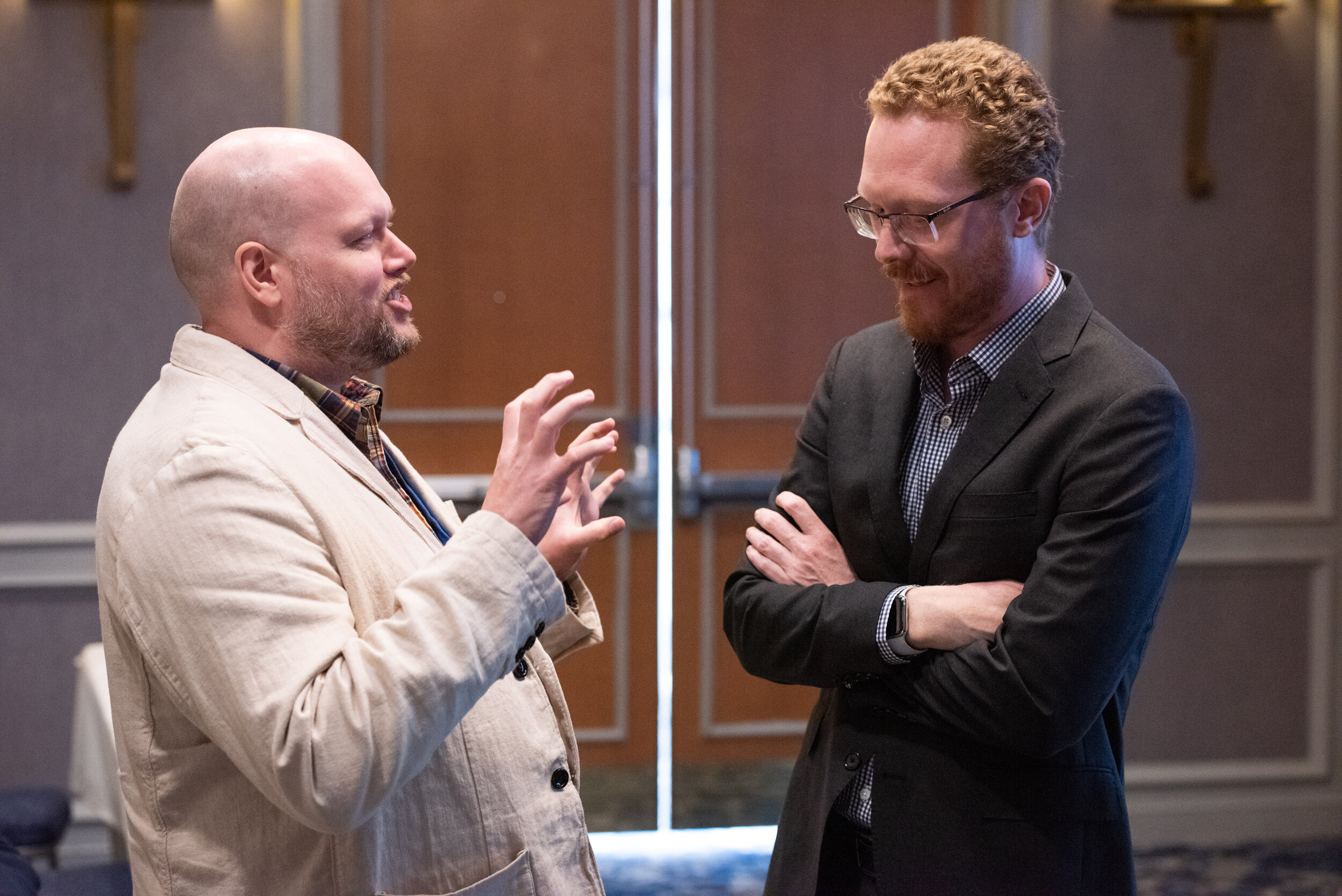
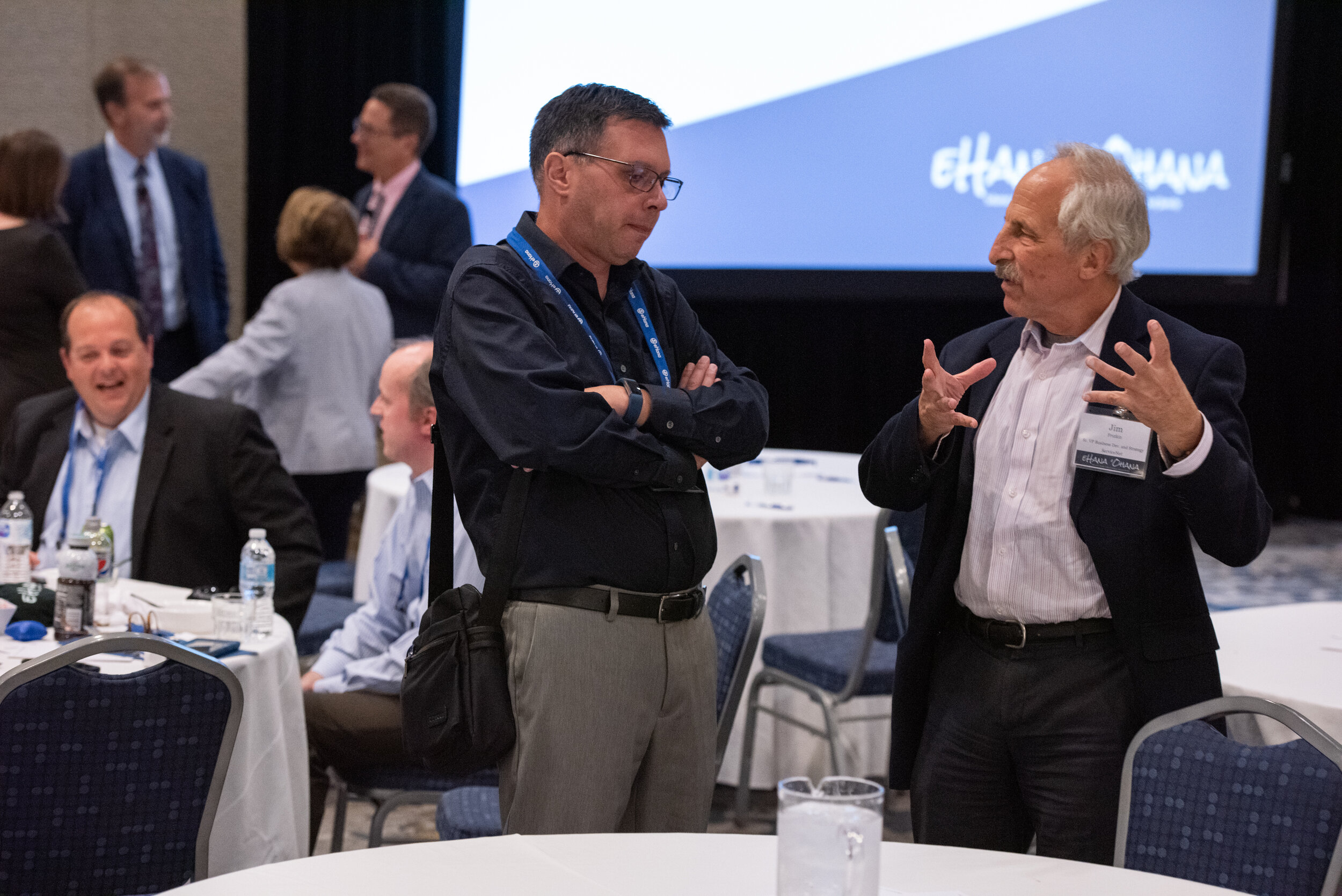
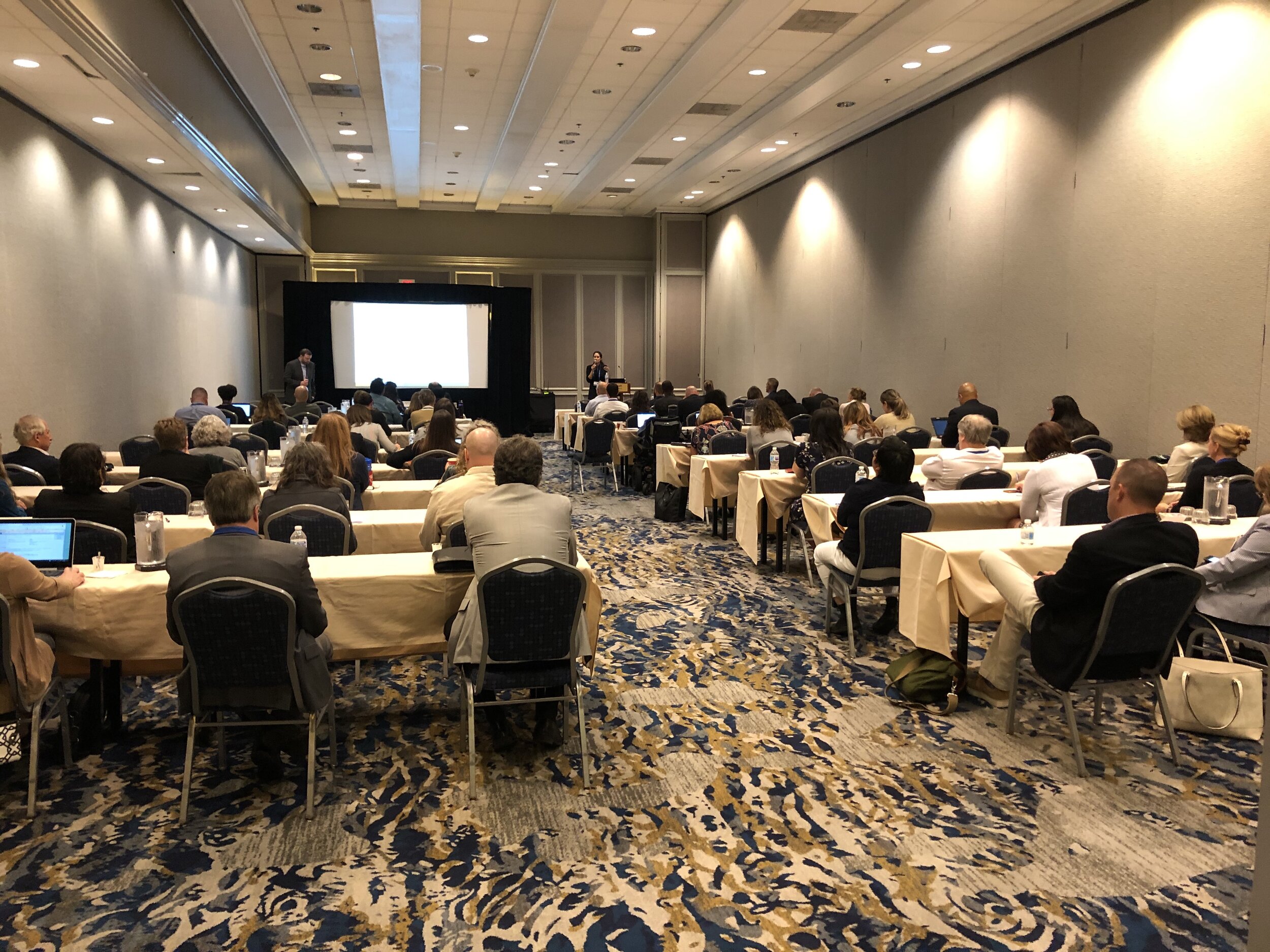
A number of sessions dealt with both practical efforts to accelerate value-based care through better data-sharing, and strategies to mitigate privacy concerns inherent in such approaches.
Deborah Jean Parsons (Aspire Health Alliance) and David Kimball (Collective Medical) focused on the benefits of real-time Event Notification Systems and how they support proactive care coordination strategies. Deborah Jean outlined the key challenges Aspire (and others) have faced within their Community Partner program: (1) locating and communicating with those who are enrolled in the program, and (2) reducing acute care episodes. She then explained how Aspire uses Collective Medical’s PreManage platform to access up-to-date contact information, gain real-time alerting for hospitalizations, and enable care coordinators to visit patients while they are still at the emergency department. David expanded on Collective Medical’s approach to managing information-sharing consents to ensure all providers stay on the same page.
Another area of critical information-sharing and partnership revolved around managing medications and prescriptions, especially for heavily regulated controlled substances. Patrick Meadows from DrFirst explained how they have begun to embed information from Prescription Drug Monitoring Programs (PDMP) directly within their e-prescribing solution, and how national and local requirements for e-prescribing controlled substances has spurred adoption of such systems. There are still challenges to adoption, however, as the platforms are generally unique to each state and there are strict limitations on how data must be stored.
Data storage and interoperability played a key role in an eye-opening presentation given by Jack Hamm of cybersecurity firm Gigamon. Jack described security as having three pillars: confidentiality (data should be accessible to only those who need it), integrity (data is trustworthy and accurate), and availability (data is available when you need it). In a presentation filled with sobering statistics and an explanation of various “threat models”, Jack explained that with the right people, the right processes, and the right technology, providers could dramatically limit their risk of a costly data breach. His key take-aways? Build an inventory of assets (it can be as simple as a spreadsheet of computers, tablets, smart TVs–anything connected to the network), control administrative privileges (they’re the primary vector of cybersecurity attacks), protect your email (70% of all attacks start through email), use multi-factor authentications (passwords on their own are not effective), and provide your team with up-to-date policies and training (and ensure senior leadership stresses its importance).
““It’s not just about how you gather data; it’s the insights you derive from it.””


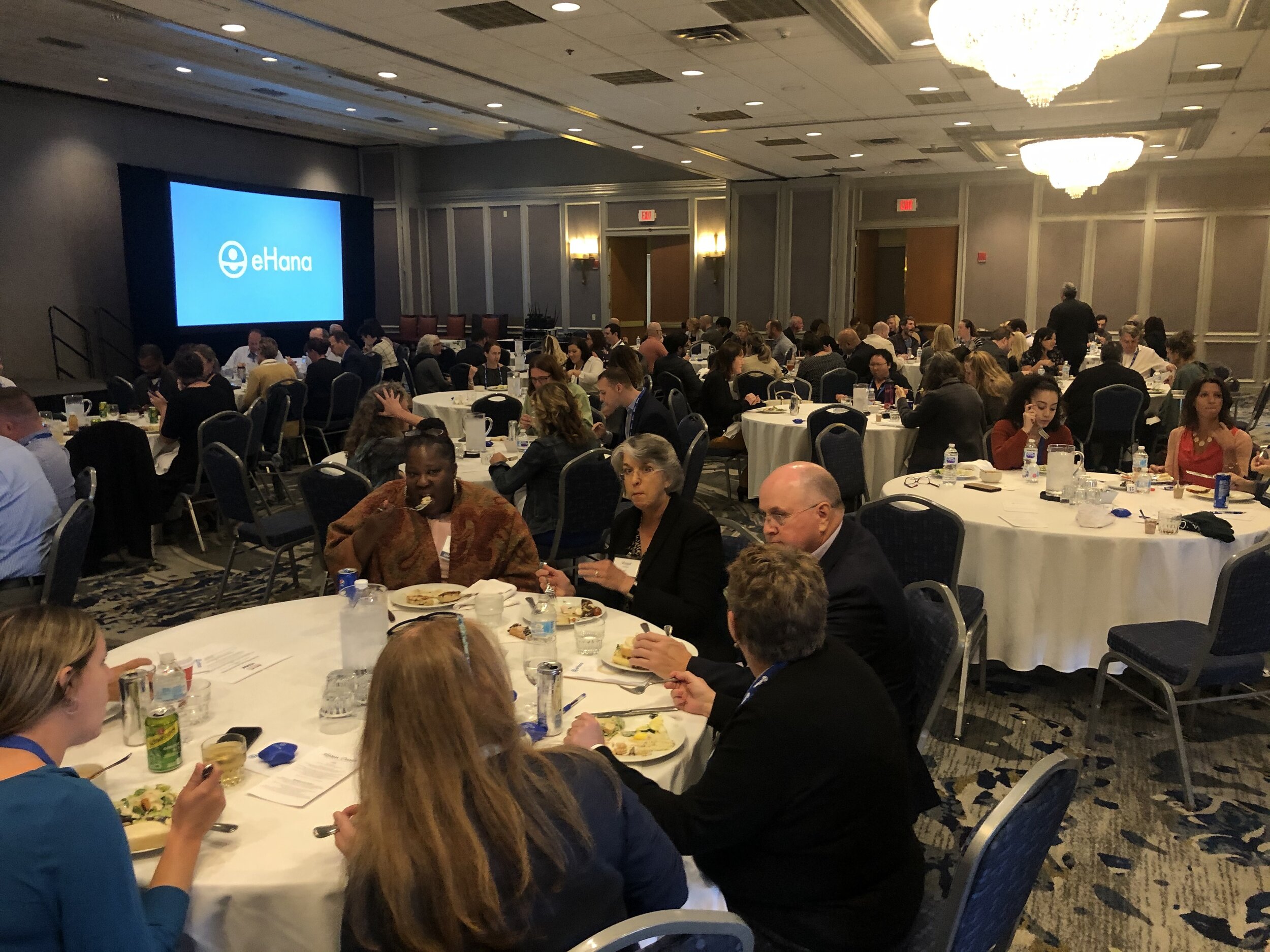

No ‘Ohana conference would be complete without eHana product demos and previews, and this year was no exception. In one session, the eHana product team provided functionality refreshers on hidden gems within the eHana platform – “forgotten” features, advanced report parameters, and EHR configurations. Not only did attendees learn about notification triggers, setting up client Teams and appointment reminders, enabling collaboration on in-progress documentation, and managing Billing Providers, they also played a game of “family feud” to test their knowledge of reports within the eHana platform!
In “Our Data-Driven Future”, members of the eHana data team demonstrated upcoming business intelligence functionality including real-time demos of cloud-based data warehouse and analytics. Understanding and analyzing data is critical in this evolving environment and the eHana team showed their commitment to providing customers with cutting-edge tools to help them become truly data-driven organizations.
Party time!
While the content and networking were engaging, the real star of the show might have been the food – the highlight of the day was the afternoon snack break, featuring fall-themed New England options including apple ice cream, pie, and cider donuts!
As the sun set over the banks of the Charles River attendees gathered with their peers for drinks and reception at the annual Networking Reception – another eHana ‘Ohana in the books. Our sincere thanks to everyone who attended the event and contributed to making it such a success. See you in 2020!


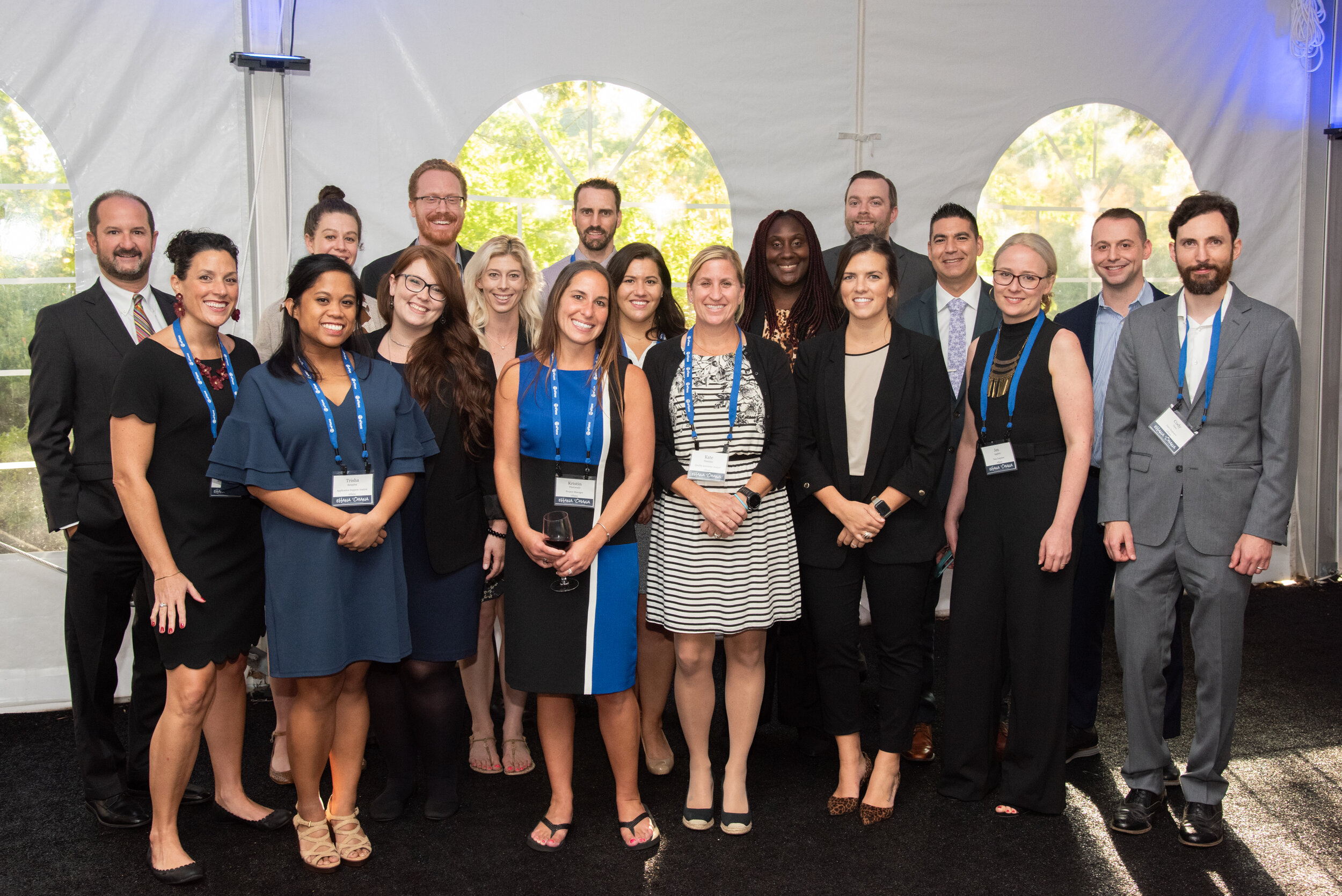

Vic DiGravio is joining eHana!
We are excited to announce that Vic DiGravio will be joining eHana as our new Vice President of Strategy in September. In this role, Vic will work directly with eHana’s community-based provider organizations to drive the shift to value-based models of care and coordinate the adoption of innovative new technologies.
Between 2007 and 2019 Vic served as the President/CEO of the Association for Behavioral Health (ABH) where he was a leader and advocate in behavioral health policy and financing issues. During his tenure he was a key figure in advocating for improved access to behavioral health care and addiction treatment in Massachusetts, including Chapter 257 and Chapter 258.
Vic also serves as a member of the Board of Directors of Baystate Community Services in Quincy, MA and serves as Treasurer of the Board of Trustees of Bridgton Academy in North Bridgton, Maine. Vic formerly served as a member of the Board of Directors of the National Council for Behavioral Health (The National Council), most recently as Second Vice Chair.
Vic is a graduate of Connecticut College and Harvard University's Kennedy School of Government and has extensive experience in governmental affairs and the not-for-profit sector. Prior to joining ABH he served for seven years as Chief of Staff to Massachusetts Senate Majority Leader Frederick Berry and before that served as Director of Public Policy for Easter Seals Massachusetts.
This new role reflects eHana’s ongoing commitment to the Massachusetts-based provider community. Vic will be based out of eHana’s Boston office where he will be able to use his deep expertise to support customers as they navigate today’s evolving healthcare landscape. Please join us in welcoming Vic DiGravio to the eHana team!
Congratulations ABH Award Recipients!
eHana is excited to exhibit and attend the Association for Behavioral Healthcare (ABH) Salute to Excellence conference, recognizing leadership in community-based behavioral healthcare. Every year this a great event for providers in Massachusetts and the ABH does a wonderful job celebrating the contributions and accomplishments of the provider community.
eHana would like to congratulate all the ABH Salute to Excellence award winners, and we especially want to recognize those from our partner organizations:
Marta Reese of Bay State Community Services for The Excellence in Administration & Finance Award
Jennifer Michaels of The Brien Center for Mental Health and Substance Abuse Services for The Francis O’Brien Award for Addiction Services
Faith Frazier of BAMSI for The Excellence in Best Practices Award
Congratulations to you all!
2018 `Ohana Recap
The fifth annual eHana ‘Ohana user group conference was our biggest and best event to date. We welcomed partners from across the Commonwealth representing both our EHR and Community Partner care management platform users.
Jacob Buckley-Fortin, eHana’s CEO, opened the event with the eHana “State-of-the-Union.” This 1980s themed presentation covered all of the happenings of the past year- and there have been many happenings- and cleverly connected how, in many respects, we’re living in the future that we imagined during the 80s. Not only with smart, self-driving vehicles (shoutout to KITT) but with the vision of establishing a structure for providing care that can reduce costs below those of fee-for-service. Like self-driving cars, this is still a work in progress, but we’ve made great strides in 2018. Jake then detailed the work eHana has done to address a number of major initiatives in 2018 including the launch of our Care Management platform for Community Partners, integrating with the Massachusetts ACOs, and developing new eHana modules built for our Adult Community Clinical Services (ACCS) providers and Community Service Agencies (CSAs).
Next up was the Industry Update panel where we were joined by Vic DiGravio III, President/CEO of the Association for Behavioral Healthcare; Sophie Jones, Director of Community Partners and Social Services Integration for MassHealth; Lauren Falls, Senior Director of Behavioral Health for Community Care Cooperative (C3 ACO); and Micky Tripathi, President and CEO of MAeHC. The discussion was informative, thought-provoking and comprised varying points of view, all of which have an impact on the Massachusetts provider community we serve.
We wrapped up the morning by reviewing the latest product updates within eHana. Some highlights (based on crowd applause) included CANS integration, Timeline Filtering, and an improved worklist.
Interested in the product update details? Reach out to eHana.
After a delicious lunch inspired by Boston’s famous North End, afternoon sessions began with informative breakout sessions. EHR users discussed best practices for expanding use of the platform, while others dug into the next steps of the Community Partner initiative. These breakout sessions were followed by six “lightning work-groups” which were brief sessions focused on specific topics where attendees could learn about eHana initiatives, brainstorm together, and network around shared priorities. Those topic areas included Population Health & Analytics, Scheduling & Calendar Management, Messaging & Patient Portal, Data Analytics & Reporting, Support team process updates, and Dashboards & Notifications.
We closed the event with our annual awards ceremony (congrats to all the winners!) followed by a reception out on the terrace overlooking Boston Harbor. Thank you to everyone that was able to join us, we hope you had a great time and we look forward to welcoming you back for 2019!
Many thanks to #KarenAnnStudios for photographing our event!
eHana Achieves Massachusetts Standardized Documentation Project (MSDP) 2017 Certification
eHana is pleased to announce that its eHana EHR has achieved recertification under the Massachusetts Standardized Documentation Project (MSDP), 2017 edition.
The MSDP is a statewide standardized documentation set intended to accelerate the move to electronic health records for behavioral health and other community providers. This unique collaboration between the Association for Behavioral Health (ABH), the Executive Office of Health and Human Services (EOHHS), Massachusetts Medicaid (MassHealth) and various Medicaid Managed Care Organizations, Medicaid Carve-Outs, and provider organizations and advocates has added simplicity and consistency to the move to EHRs within Massachusetts.
Seven major MSDP forms and interfaces received updates this year, representing the largest revision to the standard since 2013.
eHana has maintained continual MSDP certification since the program's introduction in 2010. More detail regarding the MSDP 2017 edition is available on the Association for Behavioral Health website.
Visit eHana at the National Council in Seattle!
The eHana team is excited to be once again attending, learning, exhibiting and participating at the National Council for Community Behavioral Health conference. NatCon is the premier event for behavioral health providers and this year’s agenda is jam-packed with phenomenal speakers and sessions. Healthcare integration, payment reform and healthcare technology (obviously!) are some of the areas we're most excited to engage on with the 5000 plus (conference) attendees.
If you’re planning to be in Seattle for NatCon17, we’d love to connect so, please visit us at our booth in the Solutions Pavilion (booth 704 & 803) you can also click here to schedule a time to chat with one of the attending eHana team members! If you’re not able to attend, be sure to check back in a few weeks for our conference recap! #NatCon17
The 21st Century Cures Act: Health IT and BH/SUD Impact
Yesterday President Obama signed the 21st Century Cures Act into law. The bill represents a rare display of bipartisanship during a divided time. A good resource for starting to understand the Act is this two-page fact sheet put together by the House Committee on Energy and Commerce.
Much of the Act is devoted to improving research around Precision Medicine, Vice President Biden's "Cancer Moonshot" and the BRAIN initiative investigating the causes of neurological diseases such as Alzheimer's. The Act also modernizes and streamlines the FDA drug approval process. But there is also a significant percentage devoted to Health IT and behavioral/mental health and substance use disorders.
We've reviewed the full text of the law and pulled out these key provisions we felt might be of particular interest to eHana customers and industry stakeholders.
The HIT Impact
Programs and process
Identifies a goal of reducing regulatory and administrative (paperwork) burdens related to the use of Electronic Health Records. This process will include a broad period of public comment and will specifically focus on the EHR documentation burden related to Meaningful Use (Medicare & Medicad), MIPS, APMs, and other value-based purchasing programs
Directs the National Coordinator of Health IT to further encourage development and certification of technology in specialties and sites of service where no technology is available or more is needed (possibly including BH and LTSS?)
Initiates a process for the collection of nationwide Meaningful Use statistics for both Medicare and Medicaid MU programs
Redefines "interoperability" from a legislative and certification standpoint (with an eye towards "information blocking" preventing effective interoperability)
EHR Transparency
Adds significant new "Conditions of Certification" and maintenance of certification for MU and related EHR certifications: vendors may not engage in any information blocking; may not contractually prohibit or restrict communication regarding EHR usability, interoperability, or security; must have published healthcare APIs; and must have successfully demonstrated real-world interoperability
Reduces impact on providers if they're using a product that has been "decertified" through hardship exemptions
Implements a significant new scheme to report on EHR security, usability, interoperability, conformance, etc. nationwide (note that the process "shall be designed to ensure that small and startup health information technology developers are not unduly disadvantaged by the reporting criteria")
Empowers the HHS Office of the Inspector General to investigate claims of information blocking by individual providers and practices
Support for Trusted Data Exchange
Creates a process for national standards for "network-to-network" (HISP-to-HISP) information exchange (the "Trusted Exchange Framework")
Directs definition of common standards and methods for authenticating trusted participants, rules for trusted exchange, organizational best practices for exchange, and a process for filing and adjudicating noncompliance with terms of the national standard
Provides a three-year process for development of a "Provider Digital Contact Information Index" for both individual providers and facilities -- a holy grail of interoperability -- that should, in conjunction with the Trusted Data Exchange framework, facilitate electronic interoperability nationwide
Attempts to minimize disruption of the Trusted Exchange Framework on existing frameworks and agreements and exchange within single networks by requiring HHS to defer to HIT standards developed and used by the private sector
New Health IT Advisory Committee
Supports the convening of a new unified HIT Advisory Committee committee to provide input on standards, certification, implementation specifics, etc., replacing the previous HIT Policy and HIT Standards Committees.
Creates a framework for the Committee reporting on progress and setting HIT goals and benchmarks on an annual basis
The Committee will include 25 members from across the healthcare industry and will serve for 3-year terms (limited to two terms).
HIT Impact Summary
Overall the 21st Century Cures Act provides a robust framework for continuing the successful adoption of Health IT standards and interoperable Electronic Health Records nationwide. Many of the provisions are devoted to adapting to the reality of widely-adopted Health IT, while attempting to fill in the gaps where technology adoption remains low.
The Act does continue to escalate the compliance burden on EHR vendors, although much of the actual implementation is left up to HHS and ONC. Thus it remains to be seen how the new administration will implement the law and the impact it will ultimately have.
MH and SUD Impact
HIPAA Reforms
Under the title of "Compassionate Communication on HIPAA" the Act sets the stage for some potentially significant updates to the longstanding privacy and security law:
Via a "Sense of Congress" resolution, the Act directs that clarification is needed regarding permitted uses and disclosures of PHI related to Serious Mental Illness (SMI) under HIPAA
Requires that the HHS Secretary convene a stakeholder group to discuss upcoming updates to 42 CFR Part 2 governing appropriate uses and disclosure of PHI related to alcohol and drug abuse
Broadly requires clarification and guidance related to permitted uses and disclosures of PHI for both MH and SUD (and that such guidance be effectively communicated to the patient and provider community via "easily-comprehensible" resources)
Funds development of model training programs to disseminate such guidance
Administrative Reforms
The Act mandates a myriad of programmatic changes and policy updates to modernize SAMHSA and HHS with respect to MH and SU. Among other things, it:
Eliminates the SAMHSA Administrator position and replaces it with the HSS Assistant Secretary for Mental Health and Substance Use
Establishes a Chief Medical Officer (CMO) role within SAMHSA--and requires them to have real-world experience providing MU or SUD treatment
Requires development a new quadrennial SAMHSA strategic plan and a new biennial report to Congress on SAMHSA activities and progress
Interdepartmental SMI Coordinating Committee
There is a heavy focus on what might be titled "getting serious about SMI." One of the big changes is a new Interdepartmental SMI Coordinating Committee:
Members will include representatives of HHS, CMS, DOH, CA, DOD, HUD, DOE, DOL, and SSA, as well as patients, providers, researchers, and law enforcement officers
The committee will make recommendations to Congress on better coordination of SMI and SED services and will convene working groups
Aligning MH and SUD Programs with Science and Evidence Based Treatment
Many requirements of the Act attempt to improve research and implementation around MH and SUD services.
Establishes the National Mental Health and Substance Use Policy Lab (NMHSUPL) to encourage adoption of evidence-based practices
Directs improved access to evidenced-based programs and practices nationwide
Identifies and funds Needs of Regional and National Significance program around MH, SUD Treatment, and SUD Prevention
Funding Initiatives
The Act includes numerous changes and updates to funding priorities:
Overhauls some components of Medicaid mental health coverage
Creates a framework for enhanced compliance and enforcement of parity in MH and SUD insurance coverage and benefits
Updates block grant funding for Community Mental Health Services and Substance Abuse Prevention and Treatment
Broadly reauthorizes and updates funding to MH screening and treatment programs for women, children, and adolescents
Increases and extends funding for Assisted Outpatient Treatment
Specifically funds research and expansion of Assertive Community Treatment (ACT) and Forensic Assertive Community Treatment (FACT) teams
Funds "Mental Health on Campus" initiatives and creates a new related interagency working group
Provides other grants and funding for Treatment and Recovery of Homeless Individuals, Jail Diversion Programs, Promoting Integration of Primary & Behavioral Health Care, Assistance in Transition from Homelessness, Suicide Prevention, Access to Care, Community Crisis Programs, MH Awareness Training, and Underage Drinking
Provides funding and program expansion for "Mental Health and Safe Communities", broadly comprising MH and SUD services within the justice system and law enforcement communities
Changes funding and program guidelines for foster care and TANF
Training and Workforce Development
Provides funding for MH professional training programs (psychologists, psychiatrists, social work professionals) to work in integrated care settings
Provides funding to train paraprofessionals to "emphasize the role of lived experience"
Provides for law enforcement training and workforce development
MH/SUD Impact Summary
There's a lot to digest here. Over the long term, the 21st Century Cures Act will likely have a meaningful impact on providers of behavioral health and substance use services, but it's highly dependent on the specific types of services and programs offered by each organization.
Author: Jacob Buckley-Fortin (CEO, eHana)
Massachusetts Medicaid Waiver Approved
Key payers under the 1115 Waiver (click to enlarge)
Community Partners under the 1115 Waiver (click to enlarge)
Big news today for community-based providers of behavioral health, substance use disorder and I/DD services in Massachusetts: The Center for Medicare & Medicaid Services (CMS) has approved MA's long-awaited 1115 Medicaid waiver, which will transform the Commonwealth's "MassHealth" system through new Accountable Care Organizations, BH/LTSS Community Partner entities, and Delivery System Reform Incentive Payment (DSRIP) funds.
The specific reforms proposed are complex, but the implementation is scheduled to proceed rapidly: much of the new system is planned to be in place by the end of 2017.
Key dates under the waiver include:
September 2016: ACO RFR
November 2016: MCO RFR
December 2016: ACO Pilot Launch
February 2017: CP RFR
April 2017: ACO Selections
June 2017: MCO Selections
July 2017: CP Selections
Summer 2017: DSRP Phased Launch
July-December 2017: ACO/MCO Contracting
For more information on the 1115 Waiver process, contact eHana today.
Massachusetts State House image courtesy of Colin M.L. Burnett
Embrace Change: 2016 eHana 'Ohana User Meeting recap
The 2016 eHana 'Ohana event was a huge success--the largest and most engaging event eHana has ever put on. Between networking and peer information-sharing opportunities attendees learned about healthcare reform topics, including an informative panel staffed by ACO executives and industry experts.
This year's theme was "Embrace Change," and sessions revolved around the concept that reform is coming, whether we are ready for it or not--so it's best to be prepared!
The event opened with introductory remarks, including a review of MassHealth Reform/1115 Waiver process, delivered by eHana CEO Jacob Buckley-Fortin. This was followed by an ACO panel that included industry luminaries Christina Severin, Michael Nickey, Lydia Conley, and Chris Counihan.
Following a delicious lunch eHana delivered several special (and lighthearted) awards -- including fastest implementation time, most programs implemented, and most responsive support contacts.
The day wrapped up with two detailed presentations delivered by eHana team members -- the first highlighting how agencies can get started with reform efforts, and the second explaining eHana's product roadmap and what we're doing to reinvent ourselves in this evolving environment.
Interested in session slides and materials? Reach out to eHana.
The day ended with our a customer networking reception, with tunes mixed by our very own DJ Gareth (Application Support). We hope you had a fabulous time--and if you weren't able to attend, why not? We hope to see you in 2017!
Above: The picturesque vista from the Marriott Long Wharf ballroom. Below: eHana's very own DJ Gareth rocks the beat at the post-meeting reception.
eHana congratulates Eliot & MSPCC on their merger!
The eHana team would like to extend its warmest congratulations to two customers, Eliot Community Human Services and the Massachusetts Society for the Prevention of Cruelty to Children (MSPCC), on their recently-announced merger. Both organizations have a rich history of delivering high-quality services and have been valuable eHana partners. We look forward to many years of excellence and innovation to come.
For more information, read the Boston Globe's report: Two Boston-area childrens’ services agencies merge.
Visit eHana at the National Council in Las Vegas!
Once again the National Council for Community Behavioral Health annual conference will be held at Caesar's Palace in Las Vegas, Nevada. The eHana team will attend and will be available at Booth 1137 during exhibit hall hours. We hope to see you there!
2015 "eHana 'Ohana" User Meeting Recap
eHana sends a warm "thank you" to all that made 2015's user meeting a huge success. Want to attend next year? Get in touch.













